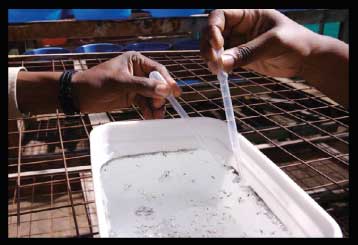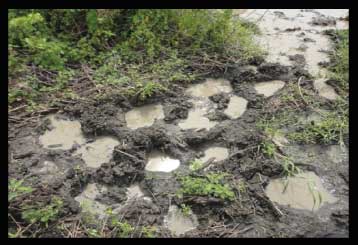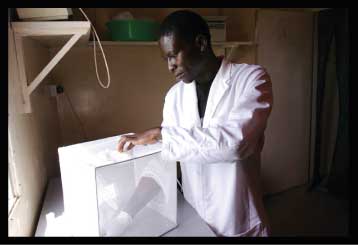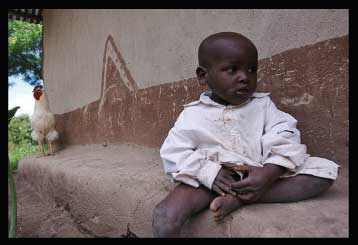In July 2010, icipe was selected as a regional centre under the Stockholm Convention on Persistent Organic Pollutants (POPs). Below Richard Mukabana discusses the importance of this new role in regard to the icipe’s integrated vector management (IVM) programmes.
Q. What is the Stockholm Convention on POPs?
A. The Stockholm Convention is a United Nations international environmental treaty, which was signed in 2001, coming into effect in May 2004. Its aim is to protect people, animals and the environment from chemicals (POPs) that are highly dangerous with long-lasting deleterious effects.
The Convention endeavours to achieve its goals by restricting and ultimately eliminating the production, use, trade, release and storage of POPs. Its implementation is overseen by the Conference of the Parties (COP), through decisions taken during periodic meetings. In addition, several institutions have been selected as regional and sub-regional centres, with the mandate of assisting developing countries to fulfill their obligations under the Convention, through capacity building and transfer of technology.
Q. How did icipe’s appointment as a Stockholm Convention Regional Centre come about?
A. By 2005, there were two Stockholm Convention regional centres in Africa: the Basel Convention Regional Centre in Senegal and the National Centre for Cleaner Technology Production in Algeria. As these two centres are located in Francophone Africa, the Secretariat of the United Nations Environmental Programme (UNEP) found it necessary to have additional regional centres, to cater for Anglophone Africa.
In accordance, UNEP conducted an assessment, which identified icipe as a potential regional centre of the Stockholm Convention on POPs. The process of having icipe formally endorsed was overseen by two scientists: John Githure, the former head of the Human Health Division, and Charles Mbogo, who is currently a visiting scientist at icipe. The two scientists made a strong case based on icipe’s past accomplishments. Since its founding, icipe has remained committed to developing environmentally safe tools and strategies for the management of arthropods. An example of this is the Centre’s integrated vector management (IVM) programmes. icipe’s IVM strategies incorporate different approaches to control mosquitoes in adult and larval stages. This approach includes scaling up the use of long-lasting insecticidal nets, larval control using Bacillus thuringiensis israelensis (Bti), community education, sensitisation and mobilisation.
icipe’s suitability as a regional centre was also supported by its leading role in articulating issues surrounding DDT, one of the pesticides regulated by the Stockholm Convention. The use of DDT was banned in most industrialised countries in the 1970s

Mosquito eggs in water
inside a semi-sealed
mosquito rearing
facility at icipe. The
Centre’s IVM strategies
incorporate different
approaches to control
mosquitoes in adult and
larval stages, which are
first tested for efficacy in
the laboratory.
Photo: Santiago Escobar

As part of its role as a
regional centre under the
Stockholm Convention, icipe
plans to create linkages with
government partners to ensure
the consideration of IVM in
national policies. Among
the issues to be addressed,
are environmentally safe
approaches to eliminate
mosquitoes, for instance by
tackling their breeding sites,
which include these hoof
prints made by hippopotami.
Photo: Santiago Escobar
based on evidence of its risks to human, animal and environmental health. Currently, COP allows the use of DDT for public health interventions, for instance in the control of malaria-transmitting mosquitoes, through indoor spraying by national health authorities under the supervision of the World Health Organisation (WHO). Today, there are about 11 countries that use DDT – most of them in sub-Saharan Africa.
icipe believes that, in addition to its documented hazards, the use of DDT has wider implications, for instance, the possible rejection of horticultural and fish exports from Africa to European markets in view of tightening restrictions on insecticide residues on products. In addition, there is widespread resistance to DDT in mosquito populations in Africa, meaning that the pesticide does not offer a sustainable solution to their control.
As a result, since 2000, icipe has been working with WHO and UNEP to assist countries in Africa to reduce their reliance on DDT for malaria vector control, mainly through training on alternative IVM strategies. The Centre’s researchers have participated in several COP meetings to articulate alternatives to DDT. icipe is also part of the ‘Stop-DDT Alliance’, which also includes the Washington-based Millennium Institute and the Biovision Foundation of Switzerland.
Q. How does the selection as a regional centre under the Stockholm Convention advance icipe’s mission?
A. Under the Stockholm Convention, the global community has committed to reduce and eventually eliminate reliance on DDT worldwide by assisting countries adopt safer and more effective alternative malaria control approaches. icipe considers the up-scaling and integration of IVM strategies to be a key element towards this goal. However, the Centre recognises that many stakeholders working in mosquito and malaria control do not have the evidence, or the access to decision-making processes, that are key prerequisites for the adoption of IVM strategies.
The appointment of icipe as a Stockholm Convention regional centre provides the Centre with the opportunity to strengthen the capacity of partners in Africa towards the incorporation of IVM into national strategies. Since 2010, icipe has organised three major training workshops on IVM as an alternative solution to the use of DDT for malaria vector control. The first five-day session, held in June 2010, was attended by 18 public and environmental health specialists from nine countries in the eastern and southern African region. The workshop, which was facilitated by researchers from the Kenya Medical Research Institute (KEMRI), Kenyatta University and Kenya’s Ministry of Environment and Mineral Resources, provided participants with technical skills on IVM. Importantly, the participants also visited the Mwea Rice Irrigation Scheme, an icipe malaria study site in central Kenya, where they observed the implementation of IVM strategies.
In March 2011, icipe organised a second 10-day training workshop for eight public health and environmental health specialists from Kenya, Tanzania, Zambia and Rwanda. The main objective of the workshop was to strengthen the capacity of countries to develop alternatives to DDT, in line with the Global Alliance mission. In addition, the sessions also aimed to provide technical skills on IVM as an alternative to harmful chemicals.
In August 2012, icipe and WHO organised a third workshop, this time on data collection, information exchange and informed decision-making on IVM. It was attended by national coordinators of the vector control programme and Stockholm Convention Focal Points from Ethiopia, The Gambia, Madagascar, Mauritius, Mozambique, Senegal, Swaziland, Uganda and Zambia. The workshop analysed the status in different countries regarding the management of DDT and other chemicals being used in vector control. The participants identified gaps, barriers and key elements required towards sound management of DDT. They also shared experiences in implementing disease vector control programmes within the IVM principles. The workshop facilitated the development of a work plan for the implementation of a project by WHO and the Global Environmental Facility (GEF), on the establishment of efficient and effective data collection and reporting procedures for evaluating the continued need of DDT for disease vector control.

David Owaga, a research technician at icipe’s Thomas Risley Odhiambo Campus,Mbita, feeding caged mosquitoes. Understanding the behaviour of mosquitoes through laboratory studies is an important aspect in the development of IVM strategies for their control.
Photo: Santiago Escobar

The appointment of icipe
as a regional centre under
the Stockholm Convention
provides the Centre with
the opportunity to lead the
incorporation of IVM into
national strategies in Africa,
contributing to saving
lives, especially those of
children under five years,
who are most susceptible
to malaria.
Photo: Santiago Escobar
In addition to the training workshops, in August 2012, icipe hosted the Fourth Interim Steering Committee Meeting of the Global Alliance for the Development and Deployment of Alternatives to DDT for Disease Vector Control. The main agenda of the forum was to evaluate cost-effective alternatives to DDT for disease vector control.
Q. What are some of future activities planned by icipe as a Stockholm Convention regional centre?
A. icipe’s vision includes working with partners to develop national plans for the promotion and management of IVM as an alternative to DDT. The Centre also hopes to create linkages with government partners to ensure the consideration of IVM in national policies. A key part of the process will involve the development of a national core group of IVM managers and technicians as well as the strengthening of regional networking for information sharing. And of course, training, through workshops and field experience, will remain a key part of the icipe’s approach.
From icipe biennial highlights 2011–2012 collaborations and partnerships, edited by Liz Ng’ang’a and Christian Borgemeister, ©2012, reprinted by permission of the International Centre of Insect Physiology and Ecology.